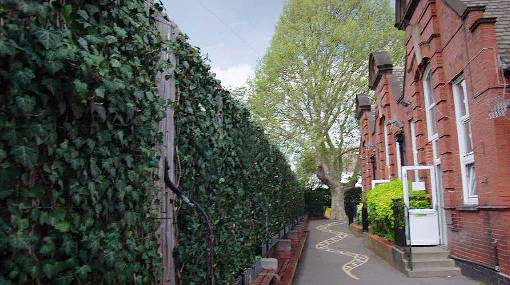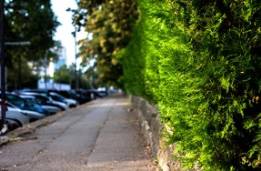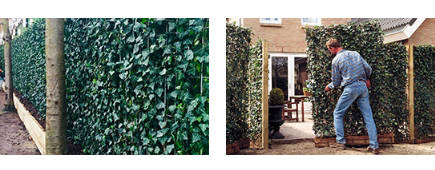Channel 4's Dispatches & Hedges Direct Reduced Air Pollution by 53%

"Air pollution hinders children's brain growth and affects their health in more ways than we previously thought." - Maria Neira, Director of Health and Environment, WHO *
Since 2006, Hedges Direct has been the UK's leading online specialist supplier of hedging and other garden plants to trade and retail customers. Over recent years, evolving environmental issues has seen Hedges Direct become proactive in its aim to both educate and provide effective, sustainable, green solutions. However, it is pollution from traffic fumes and particulate matter, now reaching high and illegal levels on a regular basis across the country, that needs urgent attention, with 1 in 3 children growing up exposed to unsafe levels of air pollution. The effects are highly detrimental leading to narrowing of airways, prevalence to lung diseases such as asthma and even affected brain development.
When you consider that an average adult breathes about 20,00 times a day, the figure for a child running and playing will be significantly more, therefore the need for improved air quality is paramount. So what is the solution? Recent studies have indicated that planting hedging or green screening products around areas frequented for outdoor leisure time, can significantly benefit the air quality within the immediate area providing a less polluted, cleaner and safer environment. Spending time in a greener environment is also recognised as being beneficial for general health and well-being, and for children in particular, it can lead to an increase in creativity, a calmer manner and becoming more engaged in the classroom.
The Lordship Lane Primary School Anti-Pollution Experiment
To test the theory, Hedges Direct were privileged to be asked to work in conjunction with Channel 4's Dispatches programme, supplying Ivy Screens and other garden plants in support of a ground-breaking anti-pollution experiment at Lordship Lane Primary School in London. Air pollution, particularly in busy urban areas and around schools is reaching dangerous and illegal levels across the UK and the statistics are shocking:
- 4.5 million children grow up in areas of high/illegal pollution levels
- 90% of children under 15 are breathing polluted air every day
- Over 2000 nurseries and primary schools are in areas of high/illegal pollution levels
- Exposure leads to an increase in lung diseases such as asthma, narrowing of the airways and even affected brain development

Over a 2 week period, the Channel 4 programme documented an experiment which saw the school undergo changes both externally and internally to attempt to combat the effects of pollution throughout.
Externally, the Hedera Helix Ivy Screens, 1.8m high x 1.2m wide supplied by Hedges Direct, were installed as a perimeter solution around the school exterior to attempt to absorb sooty particles from traffic pollution and provide cleaner air for the children when spending time outside. A garden was also created in the playground area featuring various evergreen hedging plants to help supplement this. Before the experiment, the initial findings were:
- Nitrogen Dioxide levels around the school were over 50% higher than recommended levels
- Half of the particulates found were not from exhausts at all but from brakes, plastic and tyres, including electric vehicles!
- On laboratory testing, sooty particles were confirmed in the children's lungs showing absorption of toxins
- In the playground and external areas of the school, pollution levels had reduced by as much as 53% despite pollution levels outside the school remaining high
- Further tests revealed that children had benefited immediately from the reduced exposure to pollutants
- Long-term effects of toxin exposure will be lessened leading to a healthier future
These results are also supported by the recent findings of the University of Surrey's study undertaken by their Global Centre for Clean Air Research.
Anna Kettley the Director of Programmes for UNICEF has now called for a national strategy with ring-fenced funding so that action can be taken on what she deemed a 'major child health crisis', with 86% of children now breathing toxic air as a result of 'persistent and illegal breaches of the UK Air Pollution Limits'.
Measures are being taken by the motor industry to reduce pollutants from vehicles, but substantial reductions and new government legislation to tackle the problem will all take time.
What the Channel 4 Dispatches programme highlighted along with the University of Surreys' study was that there is now evidence to prove that simple, 'green' measures can significantly reduce exposure to harmful toxins and particles from air and traffic pollution. Whilst educational funding is limited, ivy screens and other planting options can provide affordable, interim green solutions to tackle this issue.
The Channel 4 Dispatches programme 'Highlighting Britain's Toxic Air Scandal' can be viewed on Channel 4 catch-up. Click here to view the programme.* WHO quote provided by Mobilane

Hedging Products To Help Combat Air Pollution
Hedges Direct supply a comprehensive range of hedging plants and green screening, all of which can help in reducing environmental toxins, particularly at exhaust level. However, whilst any type of hedging will negate some of the effects of air and traffic pollution, it relies on leaf cover to do so. For that reason, we recommend evergreen species over deciduous, for leaf cover throughout the year. This ensures a continual toxin reducing process and year-round benefit.
The faster growing evergreens with denser foliage such as Cherry Laurel or Western Red Cedar will provide the maximum benefit in the shortest time period, however any evergreen that can grow to a reasonable height and density will have beneficial and more importantly, long-lasting efficacy. In fact, recent studies have found that dense evergreen shrubs with hairy leaves, such as Cotoneaster franchetii are particularly adept at soaking up toxins in heavily trafficked areas.

Green Solutions For Urban Areas or Restricted Space
For urban locations, areas with restricted space or security and privacy considerations, ivy screens and hedging screens are an instant solution. These evergreen screens consist of a galvanised steel frame and trough from which ivy or other hedging plants are trained and grown over the framework. Being narrow in depth they are space-saving, and are easily moved and installed. Installation can be permanent or in planters for versatility. Once mature with full leaf cover, the evergreen foliage becomes highly effective in reducing toxins and in creating privacy with added security, which is often a plus point for schools. Available in a range of sizes and species, there are options to suit.
 Hedges Direct
Hedges Direct 



